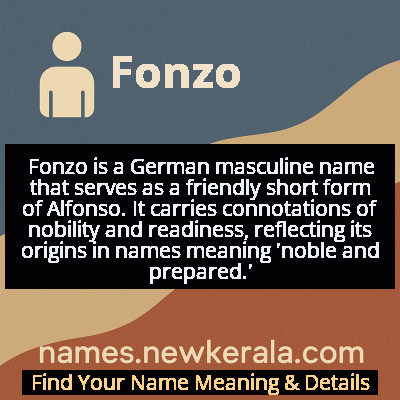Fonzo Name Meaning & Details
Origin, Popularity, Numerology Analysis & Name Meaning of Fonzo
Discover the origin, meaning, and cultural significance of the name FONZO. Delve into its historical roots and explore the lasting impact it has had on communities and traditions.
Name
Fonzo
Gender
Male
Origin
German
Lucky Number
4
Meaning of the Name - Fonzo
Fonzo is a German masculine name that serves as a friendly short form of Alfonso. It carries connotations of nobility and readiness, reflecting its origins in names meaning 'noble and prepared.'
Fonzo - Complete Numerology Analysis
Your Numerology Number
Based on Pythagorean Numerology System
Ruling Planet
Uranus (Rahu)
Positive Nature
Strong sense of order, loyal, practical, and disciplined.
Negative Traits
Stubborn, overly serious, rigid, and prone to feeling restricted.
Lucky Colours
Blue, gray.
Lucky Days
Saturday.
Lucky Stones
Blue sapphire.
Harmony Numbers
1, 7, 8.
Best Suited Professions
Managers, engineers, accountants, organizers.
What People Like About You
Dependability, discipline, practicality.
Famous People Named Fonzo
Fonzo B. Knight
Musician/Producer
American R&B singer and producer known for his soulful vocals and work in the neo-soul movement
Fonzo D. Mitchell
Community Leader
Influential African-American community organizer and civil rights advocate in the Midwest
Fonzo Rodriguez
Athlete
Professional baseball player known for his exceptional fielding skills and team leadership
Name Variations & International Equivalents
Click on blue names to explore their detailed meanings. Gray names with will be available soon.
Cultural & Historical Significance
During the 19th and 20th centuries, Fonzo spread beyond German borders through immigration, particularly to the Americas, where it maintained its European charm while adapting to new cultural contexts. In the United States, the name became associated with hardworking immigrant communities who valued both their heritage and their new homeland. The name's journey from European aristocracy to working-class communities represents the democratization of noble ideals, where qualities like honor, reliability, and strength became accessible to all. This cultural adaptation made Fonzo a symbol of integration and cultural preservation simultaneously.
Extended Personality Analysis
Individuals named Fonzo are often perceived as possessing a unique blend of traditional strength and modern approachability. The name's Germanic roots and noble origins suggest qualities of reliability, loyalty, and a strong sense of honor. Those bearing this name are typically seen as dependable individuals who value family and community ties, reflecting the name's historical connections to leadership and protection. They often exhibit a quiet confidence that comes from knowing their capabilities without needing external validation.
At the same time, the diminutive nature of Fonzo lends a certain warmth and accessibility, suggesting someone who is personable, friendly, and able to connect with people from various backgrounds. This combination creates a personality profile of someone who commands respect through competence rather than authority, who balances seriousness with approachability, and who maintains traditional values while being open to contemporary ideas. The name implies a person who is both grounded and adaptable, capable of leadership while remaining connected to their community, and who values substance over appearance in both personal and professional relationships.
Modern Usage & Popularity
In contemporary times, Fonzo has evolved into a distinctive and somewhat rare name choice that appeals to parents seeking something traditional yet uncommon. While its usage peaked in the mid-20th century, particularly among German-American communities, it has seen a modest revival in recent years as part of the vintage name trend. The name maintains strongest popularity in regions with significant German heritage, such as parts of the American Midwest and certain European communities. Modern parents often choose Fonzo for its old-world charm, easy pronunciation, and the appealing contrast between its formal royal origins and casual, friendly sound. It's frequently selected by families wanting to honor Alfonso ancestors while giving their child a more contemporary-sounding name. The name's rarity in the 21st century makes it stand out without being overly unconventional, appealing to those who value both tradition and individuality in an era where unique yet meaningful names are increasingly prized.
Symbolic & Spiritual Meanings
Symbolically, Fonzo represents the bridge between nobility and accessibility, embodying the concept of 'everyday royalty.' The name carries connotations of strength tempered with approachability, suggesting someone who possesses inner nobility without pretension. It symbolizes the idea that true leadership comes from character rather than position, reflecting its origins as a diminutive of royal names that became accessible to common people. Fonzo also represents cultural continuity and adaptation, as it traveled from European aristocracy to become a name embraced by diverse communities worldwide. The name evokes images of reliability and steadfastness, much like the Germanic warriors from whom it descended, while its shortened form suggests flexibility and modern relevance. It stands as a symbol of how traditions can evolve while maintaining their core values, and how strength can be expressed through both resilience and approachability in personal and community relationships.

